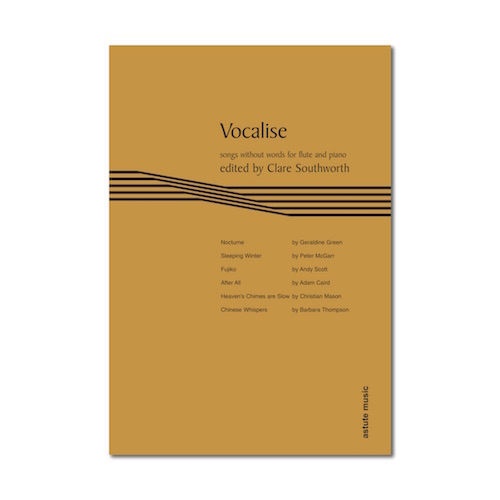- Instrumentation
- >
- Flute
- >
- flute & piano
- >
- Vocalise (flute & piano)
Vocalise (flute & piano)
SKU:
am432-03
£16.50
£16.50
Unavailable
per item
Description
Composer: Geraldine Green, Peter McGarr, Andy Scott
Composer: Adam Caird, Christian Mason, Barbara Thompson
Edited by: Clare Southworth
Instrumentation: flute and piano
Size: Pages : score 32 pages - 1 parts @ 16 pages
Astute code: am432-03
ABRSM: Grade 6
TRINITY: Grade 6 & 7
ISMN: 979 0 57031 152 1
Download available HERE
This book is also available as part of our Flute TRINITY exam pack click here
ABRSM Flute Grade 6 - Fujiko by Andy Scott
Trinity Flute Grade 5 piece - Nocturne by Geraldine Green
Trinity Flute Grade 5 piece - Nocturne by Geraldine Green
- Nocturne by Geraldine Green
- Sleeping Winter by Peter McGarr
- Fujiko by Andy Scott
- After All by Adam Caird
- Heaven’s Chimes are Slow by Christian Mason
- Chinese Whispers by Barbara Thompson
Vocalise is an exercise for voice without words and encourages the performer to concentrate on their tone production and musical phrasing, using vowel sounds, without the distraction of words.
At the beginning of the 20th century, a professor of singing at the Paris Conservatoire, A.L. Hettich, began commissioning Vocalise Etudes for use in his vocal classes. Hettich wanted to provide contemporary music as a practice aid to tonal development, to help his students understand the increasingly complex use of harmony being written at this time. He only invited tonal works and not atonal. The collection that was published grew into ten volumes and featured some of the most influential composers of the early 20th century: Poulenc, Faure, Ravel, Nelson, Copland, Roussel, Ibert, Honneger and Villa-Lobos. This incredible collection was the inspiration behind my Vocalise edition.
My invitation to the composers was to write a Vocalise for flute and piano to help develop flute tonal production and musical awareness in the “modern” style of today. I did not restrict any style of writing, letting each composer show their own individual style and character. It is an eclectic mix of styles and ideas, creating challenges musically and technically and I am immensely grateful of the amount of work involved by the composers published here.
Release your powers of imagination to open up the possibilities of expressive communication. Explore the range and diversity of the four important components of sound: tone, dynamic, vibrato and emotion, and the different dimensions of tempo and articulation.These are songs without words, so sing through your flute and enjoy them.
Clare Southworth 2011
At the beginning of the 20th century, a professor of singing at the Paris Conservatoire, A.L. Hettich, began commissioning Vocalise Etudes for use in his vocal classes. Hettich wanted to provide contemporary music as a practice aid to tonal development, to help his students understand the increasingly complex use of harmony being written at this time. He only invited tonal works and not atonal. The collection that was published grew into ten volumes and featured some of the most influential composers of the early 20th century: Poulenc, Faure, Ravel, Nelson, Copland, Roussel, Ibert, Honneger and Villa-Lobos. This incredible collection was the inspiration behind my Vocalise edition.
My invitation to the composers was to write a Vocalise for flute and piano to help develop flute tonal production and musical awareness in the “modern” style of today. I did not restrict any style of writing, letting each composer show their own individual style and character. It is an eclectic mix of styles and ideas, creating challenges musically and technically and I am immensely grateful of the amount of work involved by the composers published here.
Release your powers of imagination to open up the possibilities of expressive communication. Explore the range and diversity of the four important components of sound: tone, dynamic, vibrato and emotion, and the different dimensions of tempo and articulation.These are songs without words, so sing through your flute and enjoy them.
Clare Southworth 2011

